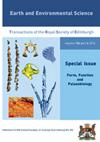“看门人地质学家”和“冷酷的唯物主义科学人”:詹姆斯·克罗尔的科学社会导航
IF 1.2
4区 地球科学
Q4 GEOSCIENCES, MULTIDISCIPLINARY
Earth and Environmental Science Transactions of the Royal Society of Edinburgh
Pub Date : 2021-05-10
DOI:10.1017/S1755691021000141
引用次数: 5
摘要
19世纪中后期,科学学会在英国科学专业文化的兴起中发挥了至关重要的作用。乍一看,詹姆斯·克罗尔加入数量有限的科学协会可能被认为是他缺乏社会信用和科学联系的结果。在这篇文章中,通过研究克罗尔的信件,我证明克罗尔对科学俱乐部和协会的选择性参与反映了他对科学愿景的战略追求,而不是党派或社会关系。我专注于爱丁堡皇家学会和地质调查局的对比历史,以及《哲学杂志》的机构历史。将这些机构置于各自的社会和文化背景下,我认为《调查与杂志》更精英、更包容的社会结构有助于解释克罗尔选择避免加入爱丁堡皇家学会的原因。本文章由计算机程序翻译,如有差异,请以英文原文为准。
The ‘janitor-geologist’ and the ‘cold materialistic scientific men’: James Croll's navigation of scientific societies
Scientific societies played a crucial role in the emergence of a professional culture of science in Britain in the midto late-19th Century. At first sight, James Croll’s membership of a limited numberof scientific associations may be assumed to be the result of his lackof social credit and scientific connections. In this article, by examining Croll’s correspondence, I demonstrate that Croll’s select participation in scientific clubs and associations reflected his strategic pursuit of a vision of science set apart from party or societal affiliation. I focus on the contrasting histories of the Royal Society of Edinburgh and the Geological Survey, as well as the institutional history of the Philosophical Magazine. Situating the institutions in their respective social and cultural contexts, I argue that the more meritocratic, inclusive social structure of the Survey and Magazine helps explain Croll’s choice to avoid affiliation with the Royal Society of Edinburgh.
求助全文
通过发布文献求助,成功后即可免费获取论文全文。
去求助
来源期刊
CiteScore
2.00
自引率
0.00%
发文量
21
期刊介绍:
Earth and Environmental Science Transactions (formerly Transactions of the Royal Society of Edinburgh: Earth Sciences) is a general earth sciences journal publishing a comprehensive selection of substantial peer-reviewed research papers, reviews and short communications of international standard across the broad spectrum of the Earth and its surface environments. The journal prides itself on the quality of its graphics and photographic reproduction. The Editors are keen to encourage interdisciplinary papers and Transactions also publishes occasional special symposia and invited volumes of specific interest.
We are currently in the process of digitising the archive of RSE Publications, and the archive of the Transactions, dating back to 1788, will be available from the back issues link on this site.

 求助内容:
求助内容: 应助结果提醒方式:
应助结果提醒方式:


